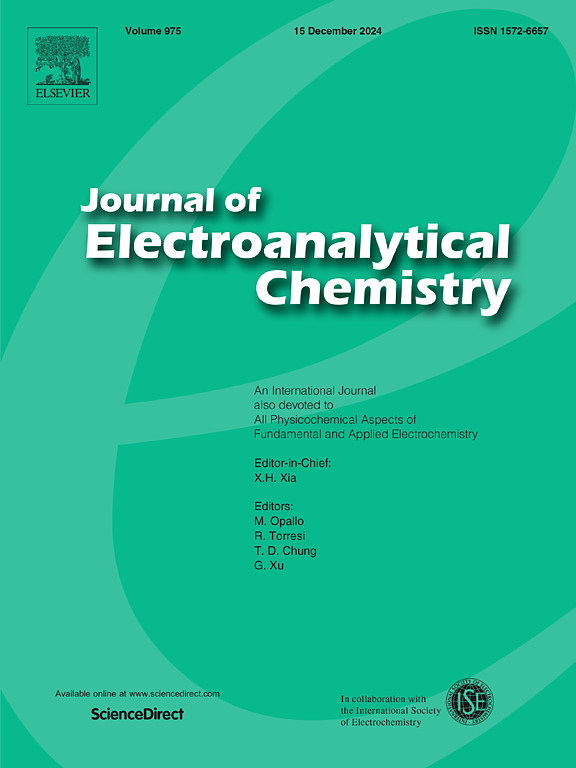Tuning the solvation structure of zinc ions via urea enables long-cycling alkaline zinc‑manganese flow batteries
IF 4.1
3区 化学
Q1 CHEMISTRY, ANALYTICAL
引用次数: 0
Abstract
This work proposes a novel strategy utilizing urea as a bifunctional anolyte additive for zinc‑manganese (Zn![]() Mn) flow batteries to regulate dead zinc formation and mitigate dendrite growth. Urea reduces the rate of zinc deposition, facilitating a uniform three-dimensional deposition and offering effective protection against alkaline corrosion of zinc via surface adsorption. The results demonstrate that incorporating 0.1 M urea into the anolyte solution of alkaline Zn
Mn) flow batteries to regulate dead zinc formation and mitigate dendrite growth. Urea reduces the rate of zinc deposition, facilitating a uniform three-dimensional deposition and offering effective protection against alkaline corrosion of zinc via surface adsorption. The results demonstrate that incorporating 0.1 M urea into the anolyte solution of alkaline Zn![]() Mn flow batteries extends the cycling time to 70 h under a current density of 60 mA cm−2, with an average coulombic efficiency (CE) of 97.1 % and an energy efficiency (EE) of 82.6 %. The results provide a promising and valuable approach to addressing the issue of zinc dendrites while also introducing an economical, sustainable, and highly reliable electrolyte alternative for Zn
Mn flow batteries extends the cycling time to 70 h under a current density of 60 mA cm−2, with an average coulombic efficiency (CE) of 97.1 % and an energy efficiency (EE) of 82.6 %. The results provide a promising and valuable approach to addressing the issue of zinc dendrites while also introducing an economical, sustainable, and highly reliable electrolyte alternative for Zn![]() Mn flow batteries.
Mn flow batteries.

通过尿素调节锌离子的溶剂化结构可以实现长周期碱性锌锰液流电池
这项工作提出了一种新的策略,利用尿素作为锌锰(ZnMn)液流电池的双功能阳极电解质添加剂来调节死锌的形成和减缓枝晶的生长。尿素降低了锌的沉积速度,促进了均匀的三维沉积,并通过表面吸附有效地保护锌免受碱性腐蚀。结果表明,在电流密度为60 mA cm−2的碱性锌锰液流电池阳极液中加入0.1 M尿素,循环时间延长至70 h,平均库仑效率(CE)为97.1%,能量效率(EE)为82.6%。该结果为解决锌枝晶问题提供了一种有前途和有价值的方法,同时也为锌锰液流电池引入了一种经济、可持续和高度可靠的电解质替代品。
本文章由计算机程序翻译,如有差异,请以英文原文为准。
求助全文
约1分钟内获得全文
求助全文
来源期刊
CiteScore
7.80
自引率
6.70%
发文量
912
审稿时长
2.4 months
期刊介绍:
The Journal of Electroanalytical Chemistry is the foremost international journal devoted to the interdisciplinary subject of electrochemistry in all its aspects, theoretical as well as applied.
Electrochemistry is a wide ranging area that is in a state of continuous evolution. Rather than compiling a long list of topics covered by the Journal, the editors would like to draw particular attention to the key issues of novelty, topicality and quality. Papers should present new and interesting electrochemical science in a way that is accessible to the reader. The presentation and discussion should be at a level that is consistent with the international status of the Journal. Reports describing the application of well-established techniques to problems that are essentially technical will not be accepted. Similarly, papers that report observations but fail to provide adequate interpretation will be rejected by the Editors. Papers dealing with technical electrochemistry should be submitted to other specialist journals unless the authors can show that their work provides substantially new insights into electrochemical processes.

 求助内容:
求助内容: 应助结果提醒方式:
应助结果提醒方式:


